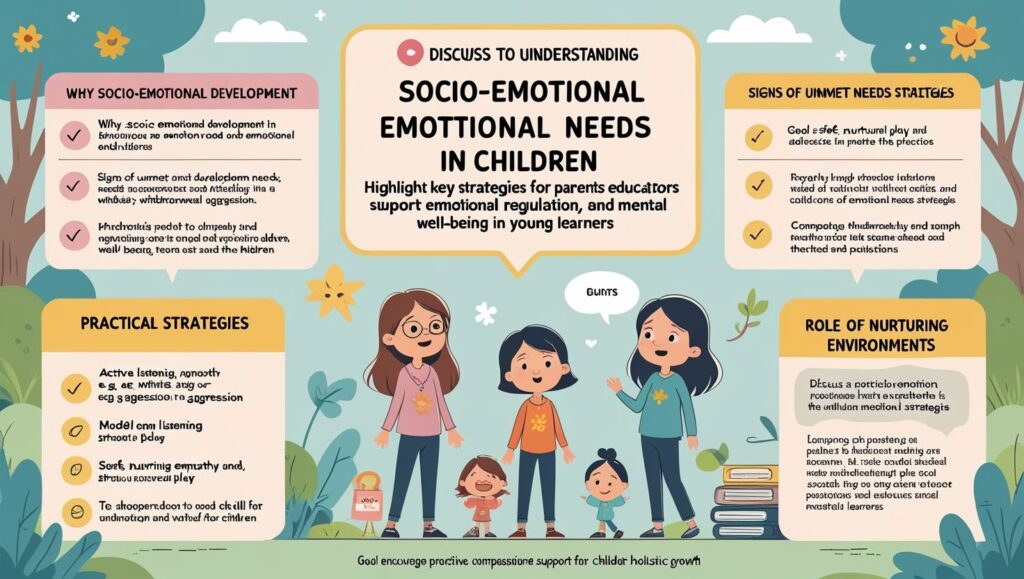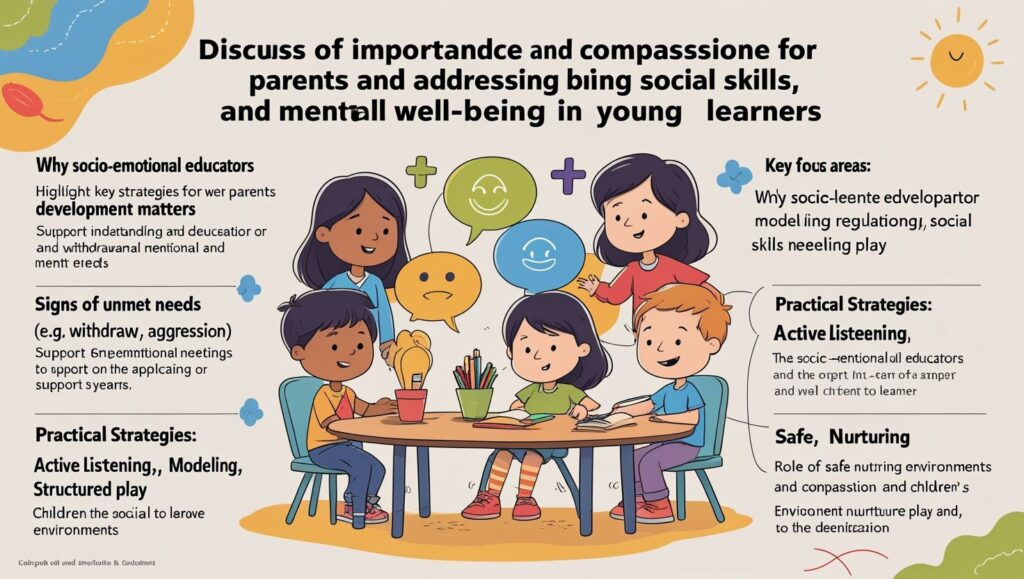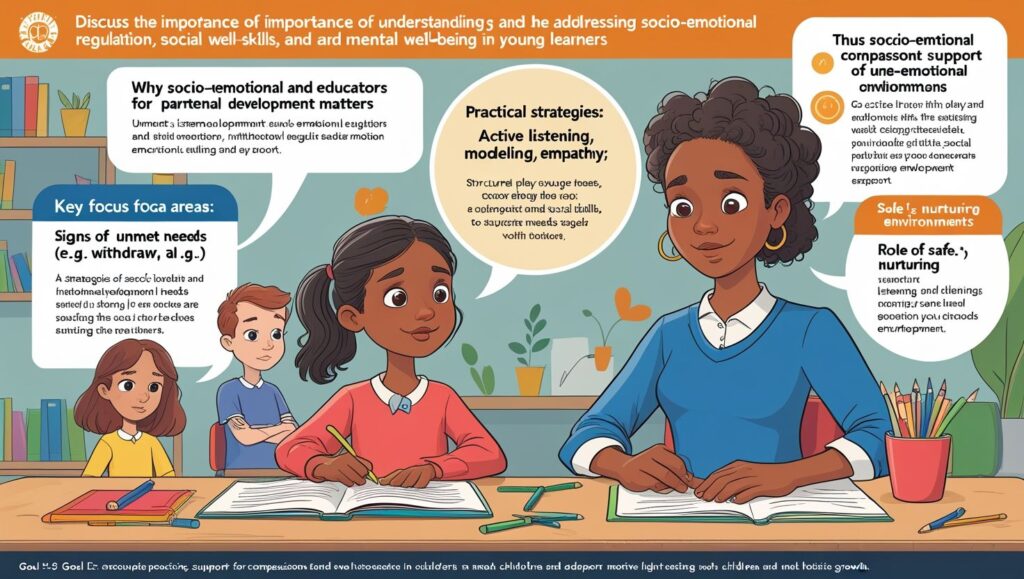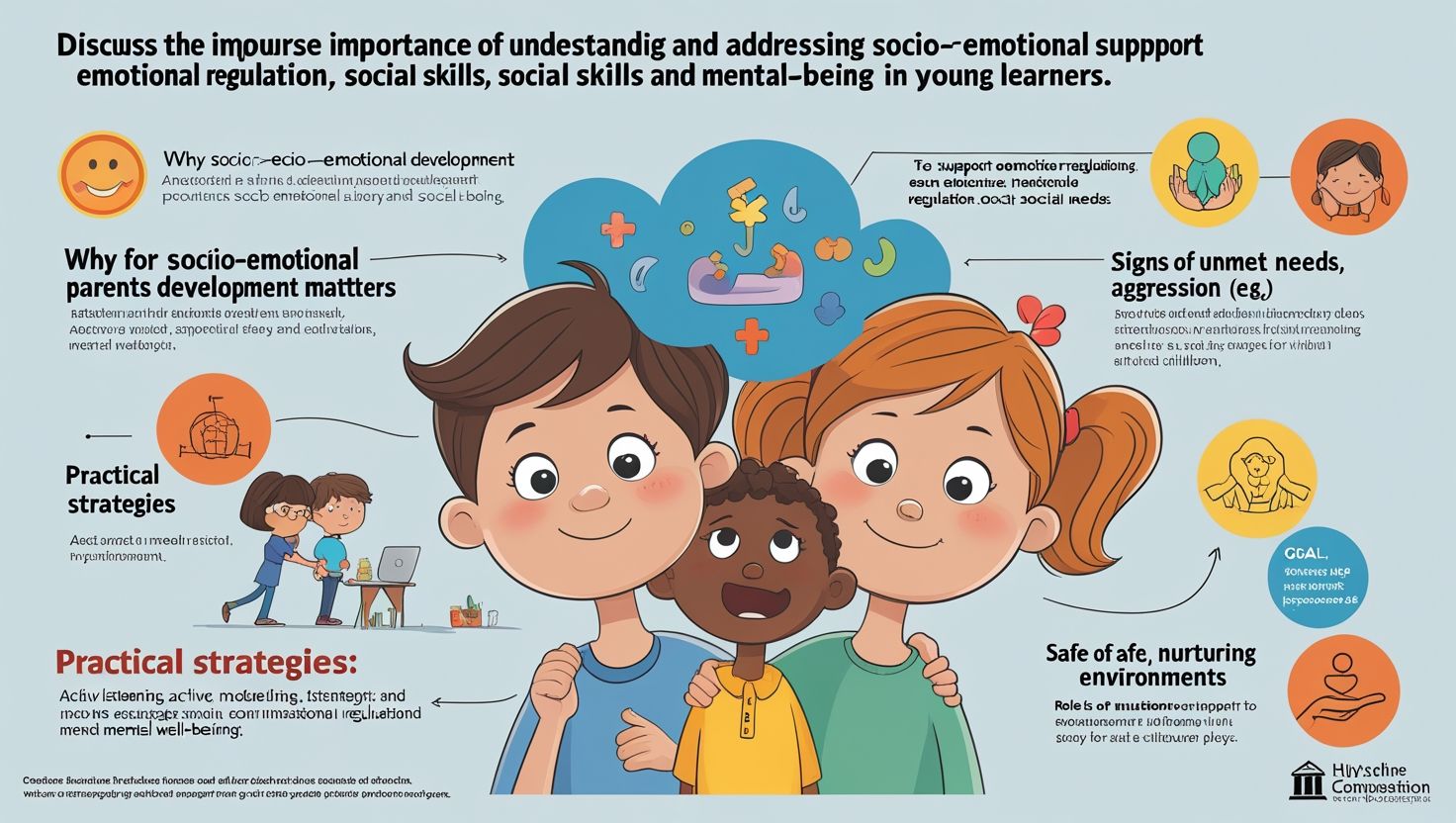Introduction
Understanding Socio-Emotional Needs in Children, Socio-emotional development is a fundamental aspect of a child’s growth, influencing their ability to form relationships, manage emotions, and succeed academically and socially. These needs encompass emotional regulation, social competence, self-esteem, and resilience—skills that shape a child’s behavior, mental health, and long-term success. When children receive proper socio-emotional support, they develop stronger coping mechanisms, healthier relationships, and greater confidence in facing challenges. Conversely, neglecting these needs can lead to difficulties such as anxiety, aggression, social withdrawal, and poor academic performance.
Educators, parents, and caregivers play a crucial role in fostering socio-emotional well-being by creating supportive environments where children feel safe, valued, and understood. Schools and homes should integrate emotional learning into daily interactions, ensuring children develop self-awareness, empathy, and problem-solving skills. By prioritizing socio-emotional development, we equip children with the tools they need to navigate life’s complexities, build meaningful connections, and thrive in all aspects of their lives.
The Importance of Socio-Emotional Needs in Child Development
A child’s socio-emotional well-being directly impacts their cognitive development, behavior, and interpersonal relationships. Emotional regulation—the ability to manage and express feelings appropriately—helps children handle frustration, stress, and disappointment without resorting to negative behaviors. Without this skill, children may struggle with impulsivity, tantrums, or withdrawal, affecting their social interactions and academic focus.
Social skills, another critical component, enable children to communicate effectively, collaborate with peers, and resolve conflicts. Children who lack these skills may experience loneliness, bullying, or difficulty forming friendships, leading to low self-esteem and disengagement from school. Additionally, self-esteem shapes a child’s confidence and willingness to take on challenges. Those with healthy self-worth are more likely to persist through difficulties, whereas those with low self-esteem may avoid risks or give up easily.
Resilience, the ability to recover from setbacks, is nurtured through socio-emotional support. Children who develop resilience adapt better to change, handle stress constructively, and maintain a positive outlook despite challenges. Schools and families must prioritize these aspects by integrating emotional learning into curricula, modeling healthy behaviors, and providing consistent encouragement. By addressing socio-emotional needs early, we lay the foundation for emotionally intelligent, socially adept, and resilient individuals.

Effective Strategies for Supporting Socio-Emotional Development
1. Emotional Literacy
Emotional literacy is the foundation of socio-emotional development, helping children identify, understand, and express their feelings constructively. When children can name their emotions—whether happiness, frustration, or sadness—they gain better control over their reactions. Educators and parents can foster emotional literacy through daily check-ins using “emotion charts” where children point to faces representing different feelings. Journaling is another powerful tool, allowing older children to reflect on their emotional experiences in writing. Guided discussions, such as asking, “How did that situation make you feel?” encourage verbal expression. Storybooks featuring characters navigating emotions also provide relatable examples for children to learn from. Over time, these practices help children develop emotional intelligence, reducing outbursts and improving conflict resolution. Schools should integrate emotional vocabulary lessons into the curriculum, while parents can model healthy emotional expression at home. The long-term benefits include improved self-regulation, stronger relationships, and better mental health.
2. Positive Relationships
Strong, supportive relationships are crucial for a child’s emotional security and sense of belonging. When children feel valued by teachers, parents, and peers, they develop trust and confidence. Active listening—giving full attention without interruption—shows children that their thoughts and feelings matter. Empathy, such as saying, “I understand why you’re upset,” validates their emotions. Consistency in caregiving (e.g., reliable routines and fair discipline) also builds trust. In classrooms, teachers can strengthen bonds by greeting students warmly, using positive reinforcement, and offering one-on-one support when needed. Peer relationships can be nurtured through buddy systems or cooperative learning activities. At home, family rituals like shared meals or bedtime talks create emotional safety. Research shows that children with secure attachments perform better academically and exhibit fewer behavioral issues. Schools and families should collaborate to maintain a network of positive relationships, ensuring children feel supported in all environments.
3. Social Skills Training
Social skills are essential for forming friendships, collaborating, and resolving conflicts peacefully. Structured lessons should teach key abilities like active listening, taking turns, and using polite language. Role-playing scenarios (e.g., sharing toys or apologizing) allow children to practice these skills in a safe setting. Group projects encourage teamwork, while guided discussions on empathy (“How would you feel in their place?”) foster compassion. Conflict resolution techniques, such as “I-statements” (“I feel upset when…”), help children express themselves without blaming others. Schools can implement social-emotional learning (SEL) programs that include cooperative games and peer mediation. Parents can reinforce these lessons by modeling positive social interactions at home. Children who master these skills experience fewer peer rejections, higher self-esteem, and better classroom behavior. Over time, strong social competence leads to healthier relationships and greater success in adulthood.

4. Self-Esteem Building
Healthy self-esteem enables children to face challenges with confidence and resilience. Instead of praising innate traits (“You’re so smart”), focus on effort (“You worked hard on this!”). Constructive feedback should be specific and actionable (“Next time, try adding more details”). Encouraging a growth mindset—teaching that mistakes are learning opportunities—helps children persevere. Activities like “strength circles,” where peers share positive traits about each other, boost confidence. Allowing children to make choices (e.g., picking a project topic) fosters autonomy. Parents and teachers should avoid comparisons and instead celebrate individual progress. Children with strong self-esteem are more motivated, take healthy risks, and cope better with failure. Schools can integrate confidence-building exercises into daily routines, while families can create affirming home environments.
5. Mindfulness & Stress Reduction
Mindfulness teaches children to manage stress and stay present. Simple techniques like deep breathing (e.g., “balloon breaths”) or guided imagery (“Picture a calm place”) can quickly reduce anxiety. Short meditation sessions or yoga breaks in school help students refocus. Progressive muscle relaxation (tensing and releasing muscles) is effective for older children. Teaching mindfulness regularly improves attention spans, emotional regulation, and impulse control. Schools can start the day with a mindful minute, while parents can practice bedtime relaxation routines. These tools equip children to handle academic pressures and social challenges calmly.
6. Play & Creativity
Unstructured play allows children to explore emotions and social dynamics naturally. Pretend play helps them practice empathy and problem-solving. Art activities (drawing feelings) and storytelling provide emotional outlets. Schools should prioritize recess and creative arts, while parents can encourage imaginative play at home. Play-based learning enhances emotional resilience and cognitive flexibility.

Conclusion:
Supporting socio-emotional development is essential for raising confident, empathetic, and resilient children. By integrating emotional learning into education and parenting, we equip young minds with the skills to navigate challenges, build strong relationships, and achieve their full potential. A holistic approach—combining emotional literacy, positive reinforcement, and mindfulness—ensures that children grow into well-adjusted adults capable of thriving in an ever-changing world. Investing in socio-emotional development today creates a brighter, more emotionally intelligent future for generations to come.

Nice write up very helpful for ecd
I don’t think the title of your article matches the content lol. Just kidding, mainly because I had some doubts after reading the article.
Thank you for your sharing. I am worried that I lack creative ideas. It is your article that makes me full of hope. Thank you. But, I have a question, can you help me?
xe85f1
uh5cwd
zy3hg2
chjjlo
a8kpzt
I like your writing style genuinely loving this web site.
I appreciate the detailed explanation. It helped a lot!
Very informative post. Looking forward to more content like this.
I was examining some of your posts on this site and I think this web site is very informative! Continue posting.
Can you be more specific about the content of your article? After reading it, I still have some doubts. Hope you can help me.
F*ckin’ awesome issues here. I’m very satisfied to look your post. Thank you so much and i am looking forward to touch you. Will you kindly drop me a mail?
Thank you for your sharing. I am worried that I lack creative ideas. It is your article that makes me full of hope. Thank you. But, I have a question, can you help me?
Respect to op, some wonderful selective information.
There is apparently a bundle to identify about this. I believe you made various good points in features also.
I just like the valuable information you provide on your articles. I will bookmark your blog and take a look at once more here frequently. I’m rather sure I will learn a lot of new stuff proper here! Best of luck for the next!
Your article helped me a lot, is there any more related content? Thanks!
Hey, you used to write great, but the last several posts have been kinda boring?K I miss your great writings. Past few posts are just a little out of track! come on!
Thank you for your sharing. I am worried that I lack creative ideas. It is your article that makes me full of hope. Thank you. But, I have a question, can you help me?
Your point of view caught my eye and was very interesting. Thanks. I have a question for you.
Азарт начинается с атмосферы. Если сайт тормозит или дизайн бездушный, вся магия пропадает. Но на Vodka Casino бонусы чувствуешь сразу: попал туда, где знают, как сделать азарт стильным. Минимум пафоса, максимум пользы. Акции работают, промокоды честные, фриспины прилетают без напоминаний. Тут ты сам выбираешь, когда и как играть — хочешь в лайв, хочешь в слоты, хочешь просто покрутить по мелочи и расслабиться. Я нашёл баланс между развлечением и шансом на выигрыш, и мне это по душе. А главное — ты не зависишь от обстоятельств. Хочешь играть — играешь. Приложение, зеркало, поддержка — всё на месте. Играешь тогда, когда тебе удобно. Такой подход дорогого стоит.
Играя на разных сайтах, не раз сталкивался с блокировками и вылетами. Поэтому, когда установил приложение Vodka Casino, был приятно удивлён: ничего не зависает, зеркало работает в фоне, никакого геморроя. Просто открываешь и играешь. Особенно удобно, что бонусы и фриспины можно активировать буквально в пару тапов. Нет навязчивой рекламы, нет бесконечных форм — только чистый, удобный интерфейс. Платформа реально даёт выигрывать: отдача высокая, а турнирные таблицы обновляются в реальном времени. Приятно видеть своё имя среди лидеров. Это добавляет мотивации. Ну и, конечно, стабильные выплаты. Это главное. За это и ценю.
Не думал, что мобильный слот может настолько затянуть. https://vodka-registration.site оказался именно тем, чего не хватало. Игры продуманы до деталей. Честность и скорость — на высоте. Промокоды придают игре вкус. Азарт здесь настоящий — как в офлайн клубе.
Я не планировал всерьёз заигрываться, думал просто покрутить барабаны и выдохнуть после работы. Но после пары выигрышей втянулся по полной. Особенно порадовало, что на официальный сайт Vodka Casino можно зайти даже если основной домен недоступен — зеркало всегда в строю. И вот с этого всё и началось. Меню простое, не нужно блуждать. Бонусы приходят стабильно, а если активировать промокод, можно сразу удвоить свой шанс на удачу. Участвовал в мини-турнире — не выиграл, но азарт получил мощный. Оценил также мобильную версию: даже на старом телефоне всё идёт чётко. Плюс лайв-дилеры, где всё как в настоящем казино. Тут не просто слот крутишь — здесь чувствуешь себя частью настоящей игры.
Wonderful goods from you, man. I have understand your stuff previous to and you’re just extremely wonderful. I actually like what you’ve acquired here, really like what you’re saying and the way in which you say it. You make it enjoyable and you still care for to keep it sensible. I cant wait to read much more from you. This is actually a wonderful site.
Appreciate it for all your efforts that you have put in this. very interesting information.
kovymd
https://t.me/s/TgGo1WIN/17
Официальный Telegram канал 1win Casinо. Казинo и ставки от 1вин. Фриспины, актуальное зеркало официального сайта 1 win. Регистрируйся в ван вин, соверши вход в один вин, получай бонус используя промокод и начните играть на реальные деньги.
https://t.me/s/Official_1win_kanal/481
I really appreciate this post. I’ve been looking everywhere for this! Thank goodness I found it on Bing. You’ve made my day! Thx again
Thank you for the auspicious writeup. It in fact was a amusement account it. Look advanced to far added agreeable from you! By the way, how can we communicate?
rwiur2
I simply couldn’t depart your web site prior to suggesting that I extremely loved the standard info an individual supply on your visitors? Is going to be again often in order to check out new posts.
What’s Happening i am new to this, I stumbled upon thi I’ve found It positively helpful and
it has helped me out loads. I’m hoping to give a contribution &
aaid other customers like its aided me. Great job. https://Yv6Bg.Mssg.me/
Your point of view caught my eye and was very interesting. Thanks. I have a question for you. https://www.binance.info/zh-TC/register?ref=VDVEQ78S
Your article helped me a lot, is there any more related content? Thanks! Регистрация на http://www.binance.com
I truly appreciate this post. I?¦ve been looking all over for this! Thank goodness I found it on Bing. You have made my day! Thanks again
I have been browsing on-line greater than three hours nowadays, yet I never found any attention-grabbing article like yours. It is beautiful worth enough for me. In my view, if all website owners and bloggers made excellent content as you probably did, the internet shall be much more helpful than ever before.